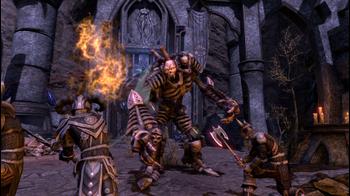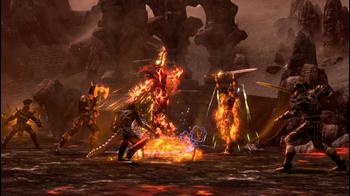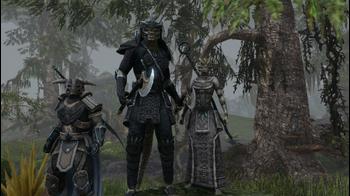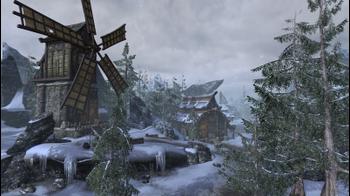
The Elder Scrolls Online Hands-On Preview
Let's be fair - the Elder Scrolls Online had a pretty rough showing at E3. That's putting it nicely. "Words like hollow and unimpressed instantly started to fill my head," Zack wrote, and I remember seeing his dejected disappointment first-hand at the hotel after the show.
My story, I'm pleased to report, is different. Bethesda realized their mistake - and they knew the best way to fix it. Hands-on time. Let those who complained play the game. So we did.
The Elder Scrolls Online faces one particularly gargantuan task - merging the two camps of die hard MMO players and your average Elder Scrolls fan, who loves RPGs but likes them as offline, single-player based and focused affairs.
TESO works to address this in a number of ways. First up there's how it handles, which far more closely resembles a traditional action-based RPG - specifically Skyrim - than the typical MMO.
There's an on-screen reticule which moves your field of vision about like any third person action game. If you need a mouse for inventory or other things you simply have to hit Ctrl to take that away and gain proper mouse control - but I rarely needed it.
Instead this controls like Skyrim, with skills attached to hotkeys and basic attacks actioned by clicking or holding the left mouse button, while blocking is mapped to the right.
The traditional MMO concept of cool-downs on special moves has been removed, too, to stop the game from feeling more turn-based than single player Elder Scrolls efforts.
Like those games special moves can now be executed as long as you've sufficient mana, and if you want to spend that mana spamming one move repeatedly, you can - that's your choice.
In combat this moves with an ebb and flow that'll feel familiar to players and fans of Oblivion and Skyrim in particular, and does a great job of hiding that the engine beneath is more heavily based on statistics and rolls than the rest of the Elder Scrolls series - as beneath, the heart of an MMO still beats.
Enemies are animated in a way which makes their intended movements obvious and from there the rock-paper-scissors of blocking, charging heavier attacks and dishing out light attacks unfolds. Even though in my four hours I was only able to play to around level 10, I found combat satisfying.
I was hungry for more skills to diversify the experience, but with around 20 planned for each race plus a suite of skills attached to weapons and armour the final game will have plenty to learn.
Any race can equip any type of weapon or armour, as in the single player Elder Scrolls games, restrictions raised. There are natural drawbacks - a warrior would be unwise to equip cloth armour, for instance - but the game allows it anyway. It's up to players to find weird set-ups that then work for them.
Each class of armour and weaponry carries with it a set of skills, some active and some passive. These are learned by simply using the weapon, and level independently of your character.
This means a character at 50, the planned launch level cap, could still have skills to learn via previously unused classes of armour and weapons.
I could write about all this for hours, but the long and the short of it is that this feels like an Elder Scrolls MMO - the key being that it is Elder Scrolls first and an MMO second. Obsessive players can search every box, chest and pot they find for minor items like fruit and bread - and they can then be used in the game's crafting process, for instance. And yes - lock picking is in.
The core narrative can be played from start to finish alone, but extras wait for those willing to group. Public dungeons will also be included, and will be near impossible to tackle without help from allies.
MMO influences bleed into and give more value to some of the traditional Elder Scrolls concepts, too. As an example, imagine trading many of those smaller, randomly generated items you loot with other players.
While this is an MMO there's still a sense of choice. At one point in my four hours, I'm given a choice between saving a military base or a civilian encampment. The one I choose survives, and the characters within will make choices within that effect the development of that zone. I'll always see those changes in my game - meaning choices matter and effect the path and flow of quests.
There is a worry, though - does this sound too single-player focused? The player needs incentive to group, and in the low-level play I experienced there wasn't much incentive to do so.
This is something the team needs to nail - but for now I can confidently say that they appear to have produced an online game that'll be familiar and satisfying to the Skyrim audience - and it works.
I've saved the most interesting part of The Elder Scrolls Online until last, though - and it's something we didn't directly see, but merely had explained to us: the Mega Server.
It's impossible to see, in a sense - the mega server is a concept. What's worse in an MMO than looking at a list of servers? Roleplay, PVP, regular, full, empty... it sucks. It brings with it problems, too, such as connection queues, empty servers and friends ending up separated. The system sucks - and Bethesda agree.
When players boot The Elder Scrolls Online they'll encounter no such list - they just hit play. All players are housed on one 'mega server' - thus the name - and are hosted in 'pockets' of world.
The starter area may be fit to house 300 people before being overcrowded - this is my example, not theirs - and at peak times the game could have hundreds of these areas running, each populated by almost 300 players. At quieter times, the 'mega server' simply scales down the number of pockets running and pushes more players together. The first advantage is simple - areas should never look dead.
In order to determine what kind of people you're matched with the game asks you to toggle settings.
If you're a player who likes to roleplay, you simply need to flag that to the game, and it'll then try to place you in a pocket of existence with other roleplayers. If you want to play with people who are looking to group, likewise. Solo fan? Same deal.
The final pillar of determining where you end up is your friends. The game will make an effort to place you together with your friends above all else - ensuring there's never a situation where two friends are trapped apart by server decisions.
This even extends to recent players - so if you group with strangers and play with them for some time, the game will notice and try to ensure you have a chance to bump into each other once more.
It's clever and seamless - and if it works exactly how the team describe it, it could revolutionize the MMO genre completely. The server-picking game is a pain in the ass, and this sense of freedom makes everything easier - especially the game's crazy PVP plan, which involves battles which include attacks on cities by hundreds of players with siege weaponry.
Some of Zack's initial concerns from E3 still stand, and a new one has been raised by the showing of just how like Elder Scrolls this is; namely if the MMO elements will stand as tall and as strong as they need to. With that said, The Elder Scrolls Online no longer looks weak - in fact, it looks like one of the strongest, most carefully thought out contenders in its category for a while.
Disclosure: Bethesda Softworks invited RPG Site to visit their ZeniMax Online studio in Baltimore, MA to see the game. Travel and accomodation was funded by the company.



